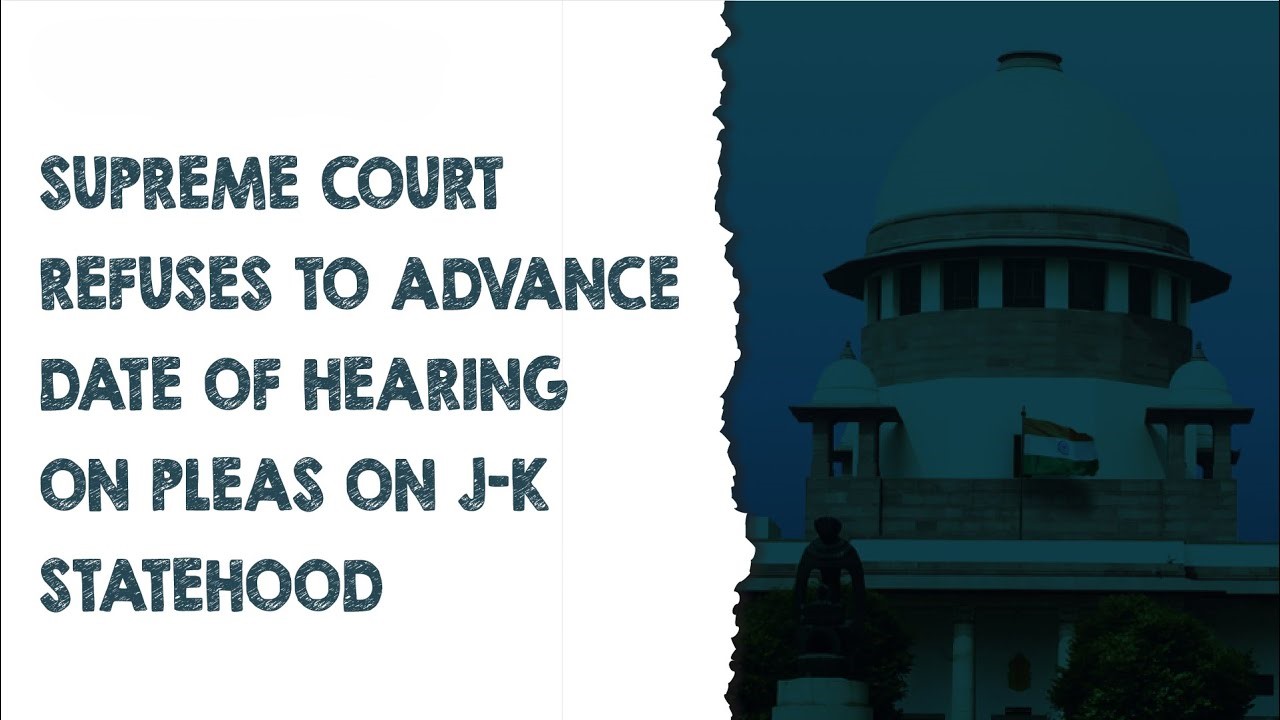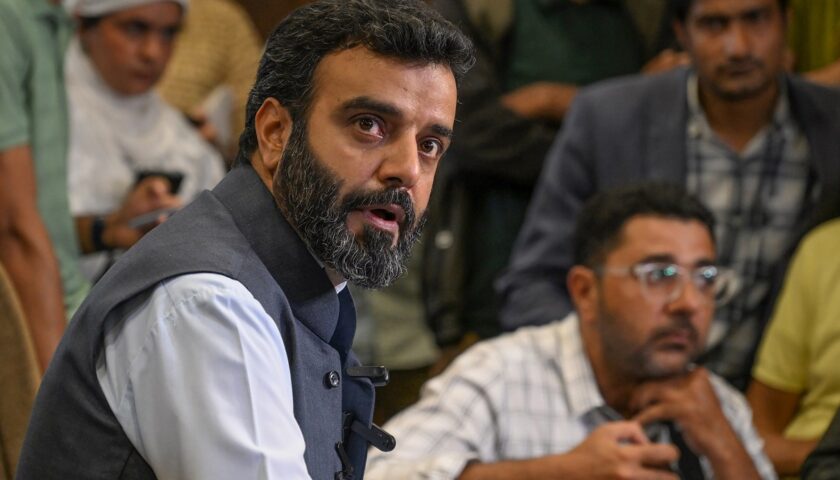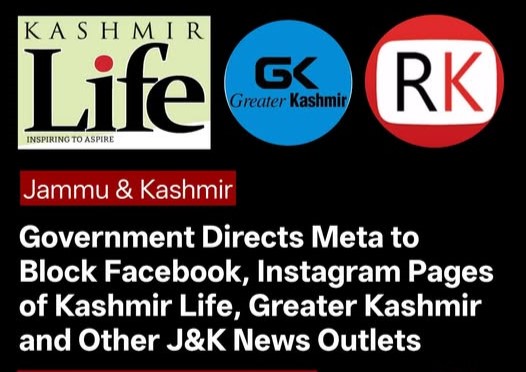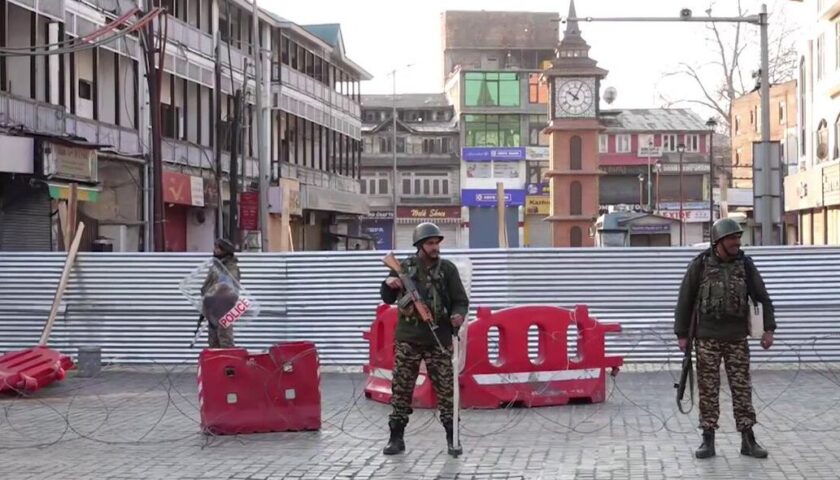J&K Statehood Case: Supreme Court Sticks to October 10 Hearing Date Amid Rising Public Frustration
By: Javid Amin | 25 Aug 2025
Supreme Court Holds Firm: “It is Already Listed”
The long-standing issue of Jammu and Kashmir’s statehood restoration took another turn this week when the Supreme Court of India refused to advance the scheduled hearing date. A petition had sought urgent consideration, citing both constitutional urgency and growing public frustration, but the apex court firmly stated that the matter will be taken up as planned on October 10, 2025.
The bench, led by Chief Justice B.R. Gavai, noted:
“It is already listed on October 10.”
The judges highlighted that the Court is currently preoccupied with a Constitutional Bench hearing on presidential timelines, and therefore could not alter the schedule.
This decision comes against the backdrop of intense political debate in Kashmir, where demands for the restoration of statehood—alongside discontent over unfulfilled promises—have reached a critical point.
Background: From Article 370 to Union Territory
To understand the significance of this hearing, it is important to revisit the chain of events since August 5, 2019, when the Government of India abrogated Article 370 and bifurcated Jammu & Kashmir into two Union Territories:
-
Jammu & Kashmir (with a Legislative Assembly)
-
Ladakh (without a Legislative Assembly)
The move was hailed by the Centre as a step towards “integration and development,” but it left J&K without full statehood and with reduced constitutional autonomy.
Since then, multiple petitions have challenged aspects of this reorganization, including:
-
Whether the abrogation of Article 370 was constitutionally valid.
-
Whether Parliament exceeded its powers by converting a state into a Union Territory.
-
Whether statehood must be restored within a binding timeframe.
December 2023 Verdict: What the Supreme Court Said
In December 2023, the Supreme Court delivered a landmark judgment:
-
Article 370 Abrogation Upheld: The Court ruled that Parliament acted within its powers in abrogating Article 370.
-
Elections Must Be Held: Directed the Election Commission of India to conduct Assembly elections in J&K by September 2024.
-
Statehood Must Return: Ordered the Union Government to restore statehood to J&K “at the earliest.”
While elections were eventually held in 2024, the question of statehood restoration remains unsettled—leading to the present petitions.
Petitioners’ Argument: Why Advance the Hearing?
During the latest proceedings, a lawyer representing the petitioners argued for urgency, stating that:
-
Five years have already passed since J&K lost statehood.
-
The delay undermines federal principles enshrined in the Constitution.
-
Citizens are suffering from a democratic deficit, where elected leaders operate under curtailed authority compared to other states.
The petitioners reminded the Court that just as it imposed a timeline for elections, it must also enforce one for statehood restoration.
Supreme Court’s Response
The Court, however, chose caution. Chief Justice B.R. Gavai and his bench maintained that:
-
The matter is already scheduled and cannot be expedited.
-
Ongoing constitutional hearings limit the Court’s bandwidth.
-
The Pahalgam terror attack in April 2025—which killed 26 civilians—cannot be ignored when considering the timing and security implications of statehood restoration.
This last observation has drawn criticism from regional leaders, who argue that terrorist actions should not dictate constitutional rights.
Security vs. Democracy: The Pahalgam Factor
The Pahalgam attack has become an unexpected variable in the statehood debate.
-
On April 22, 2025, militants carried out a devastating attack in Pahalgam, killing 26 civilians.
-
The incident shocked the nation and reignited debates about cross-border terrorism.
-
The Centre has since argued that such security challenges complicate the immediate restoration of statehood.
However, leaders like Omar Abdullah have strongly objected to this reasoning, saying:
“Will terrorists decide our future? Our rights cannot be hostage to violence.”
Political Reactions: Kashmir’s Leaders Push Back
The Court’s refusal to advance the hearing has stirred political debate:
-
Omar Abdullah (NC): Expressed disappointment, calling the delay “unfortunate” and urging the Court to act with the same urgency it did for elections.
-
Mehbooba Mufti (PDP): Accused the Centre of “deliberately delaying” statehood to maintain direct control.
-
Sajad Lone (People’s Conference): Warned that prolonged uncertainty only alienates Kashmiri youth further.
The debate now transcends legal arguments—it is about trust, legitimacy, and the Centre’s credibility in Kashmir.
Implications for J&K’s Political Future
The October 10 hearing is now being seen as a defining moment in Kashmir’s political journey. Its outcomes could:
-
Restore Statehood with a Deadline: If the Court sets a timeline, it will force the Centre to act.
-
Leave it Open-Ended: A vague “earliest possible” order may continue the current stalemate.
-
Tie Statehood to Security Conditions: Linking constitutional rights to terror incidents could spark outrage and instability.
Either way, the political temperature in J&K is rising steadily.
Wider Geopolitical Angle
This debate does not exist in isolation. Internationally:
-
Pakistan continues to highlight J&K in its diplomacy, with Deputy PM Ishaq Dar recently offering dialogue with India, including on Kashmir.
-
Global human rights groups have urged India to restore statehood and civil liberties in the region.
-
India’s allies (like the US) have quietly pressed for democratic normalization but continue to back India’s sovereignty.
Thus, the Court’s decision will not only shape Kashmir’s domestic politics but also India’s global narrative.
The Road Ahead: October 10 as the Next Turning Point
For now, all eyes are on October 10, 2025.
-
Citizens await clarity on when J&K will once again enjoy full statehood.
-
Political leaders prepare to use the intervening weeks to mobilize public opinion.
-
The Centre remains cautious, balancing security concerns with constitutional obligations.
The people of Jammu & Kashmir, however, see only one thing clearly: their patience is wearing thin.
Conclusion
The Supreme Court’s refusal to advance the hearing reflects its cautious approach but has amplified frustrations in Kashmir. While elections were restored under judicial intervention, statehood remains in limbo.
The October 10 hearing will thus serve as a litmus test—for the judiciary’s role in upholding constitutional federalism, for the Centre’s sincerity in restoring rights, and for Kashmir’s fragile democratic trust.
Until then, one question echoes across the Valley: “How long must we wait to be equal again?”




